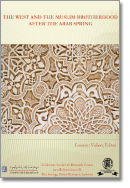Canada and the Arab Islamists: Plus ça change...

Autor(en): Alex Wilner
Herausgeber: Lorenzo Vidino
Buchtitel: The West and the Muslim Brotherhood After the Arab Spring
Seiten: 56-67
Verlag(e): Foreign Policy Research Institute
Publikationsjahr: 2013
